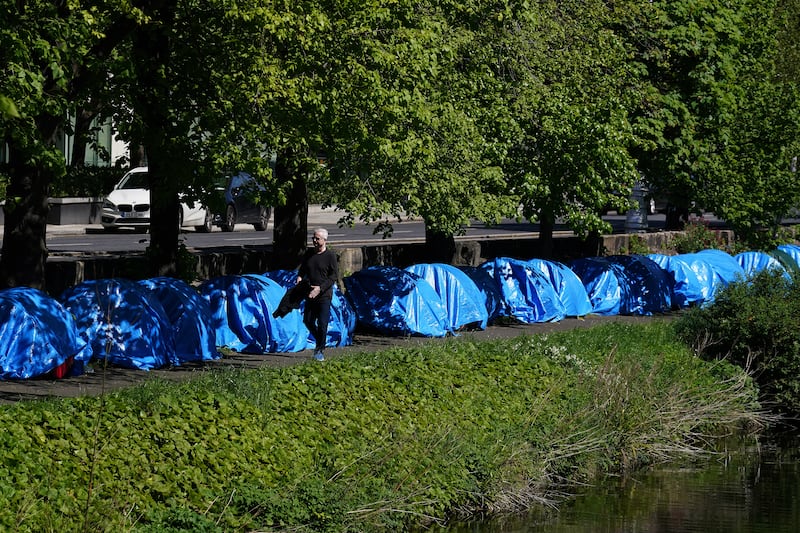Ireland is changing before our eyes as a result of the refugee crisis, and the decisions taken now by ministers, north and south, will have consequences for decades to come.
It would be unreasonable to demand that comprehensive plans should already be in place, but it is fair to expect that key figures on both sides of the border should at the very least be in regular contact during a vital debate which mainly and intriguingly reflects the different strands in modern nationalism rather than familiar orange/green disputes.
The forthright suggestion last month from the Irish justice minister Helen McEntee that some 80 per cent of asylum seekers arriving in the Republic had crossed the border from the north was a significant moment at a number of levels in this context.
Taoiseach Simon Harris then asked his Fine Gael colleague Ms McEntee to bring proposals to cabinet which would allow the return to the UK of those described as inadmissible international protection seekers, prompting some noticeably cold exchanges between Dublin and London.
- Half of Republic’s voters support border checks, according to pollOpens in new window
- Politics is the both the source and solution to migration concerns - The Irish News viewOpens in new window
- Grand Canal asylum seeker campsite situation won’t become ‘another Mount Street’ Taoiseach vowsOpens in new window
However, the initial assessment given by Ms McEntee was immediately questioned by the Irish Refugee Council in Dublin and the Committee on the Administration of Justice in Belfast, while Tánaiste and Fianna Fáil leader Micheál Martin said bluntly that her figures were “not statistical”.
The Stormont first minister, Michelle O’Neill of Sinn Féin, then weighed in to declare that she not been consulted about the new Irish legislation and was yet to hear from the taoiseach, the tánaiste or the justice minister.
It will be accepted that party political factors may have been at work across the board, particularly with both European and local government elections taking place in the Republic next month, but it cannot be disputed that the lines of communication between some senior representatives are capable of being greatly improved.
While Ms McEntee found herself under serious pressure after her initial intervention, it turned out that, although there are still some queries over her statistics, there actually is firm evidence to indicate a sudden spike in the number of refugees travelling from the north into the south.
As a report in this newspaper set out last week, statistics eventually produced by the Irish justice department indicated that up to 7,000 asylum seekers passed through the north’s ports and airports before crossing the border into the Republic so far this year.
There are inevitably some complex factors involved, but, as 90 per cent of applications for asylum are being made away from the Republic’s ports of entry, we are probably entitled to conclude that most have arrived from Britain via the north.
We have had a British-Irish Council and a range of other cross-border bodies in place since the signing of the 1998 Good Friday Agreement but the actual amount of meaningful engagement taking place between the various politicians and civil servants remains open to interpretation
Although Ms McEntee may well have had at least some grounds for her 80 per cent assertion, the lack of wider discussions preceding her intervention, as some crucial legal rulings are separately analysed, was striking.
This may not have been entirely down to the embattled justice minister, but Mr Martin was plainly not impressed, while Ms O’Neill had even stronger grounds to believe that she should have been much more fully briefed on developments which had considerable implications across various Stormont departments.

It now seems that around 7,000 vulnerable people have arrived in Northern Ireland in the space of four months without coming to public attention, even if their stay in the jurisdiction may not have been very long.
They deserved to be treated with compassion and understanding, and provided with necessary medical and other support, as do all refugees everywhere in Ireland, but officials appear to have been either largely or completely unaware of their existence.
Those who arrived were obviously at the risk of being seriously exploited if they had no access to proper advice, as was demonstrated by the alarming claims put forward by some who felt unable to use the normal bus and train services.
One Nigerian asylum seeker told the Politico website that he paid a driver £2,400 to take him from Belfast to Dublin, when a legitimate taxi firm would have charged less than £150 for the same fare, and, as similar reports emerged elsewhere, there is a danger that many other criminal opportunities could occur.
We have had a British-Irish Council and a range of other cross-border bodies in place since the signing of the 1998 Good Friday Agreement but the actual amount of meaningful engagement taking place between the various politicians and civil servants remains open to interpretation.
If all concerned had jointly and constructively looked at how to handle the 107,000 Ukrainians desperately relocating to all parts of Ireland after their country was invaded by Russia in 2022, it is difficult to accept that 97 per cent of them would have ended up south of the border.
The previous suspension of Stormont did not help but it must surely be possible to promote a culture which enables our senior office holders, regardless of their constitutional and party political positions, to effectively exchange information and views. It’s good to talk.








